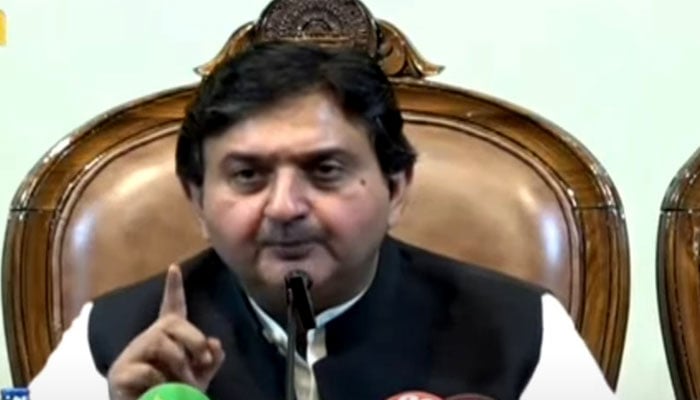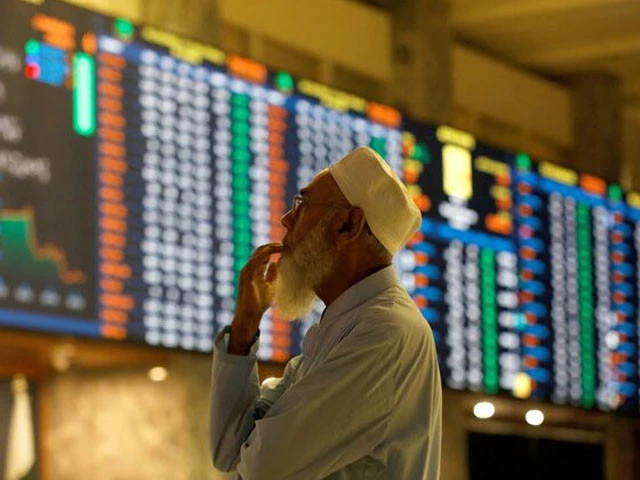Defending his move to file disqualification reference against 26 opposition members of the provincial assembly (MPAs) over “unparliamentary conduct”, Punjab Assembly Speaker Malik Ahmad Khan said that he took action under the Constitution as he could not allow “vulgar language” in the House.
“I have always acted as a good custodian of the House, but I cannot permit the use of vulgar language on the assembly floor,” he said while addressing a press conference in Lahore on Monday.
Khan
Defending his move to file disqualification reference against 26 opposition members of the provincial assembly (MPAs) over “unparliamentary conduct”, Punjab Assembly Speaker Malik Ahmad Khan said that he took action under the Constitution as he could not allow “vulgar language” in the House.
“I have always acted as a good custodian of the House, but I cannot permit the use of vulgar language on the assembly floor,” he said while addressing a press conference in Lahore on Monday.
Malik Ahmad’s presser comes days after he filed disqualification reference against 26 PTI-backed opposition MPAs with the Election Commission of Pakistan (ECP).
The disqualification reference was filed following the unrest during the Punjab Assembly budget session when opposition members raised slogans and disrupted the proceedings.
In an order dated June 27, the speaker, while exercising powers conferred under Rule 210(3) of the Rules of Procedure 1997, suspended the opposition members for a total of 15 assembly sessions.
He confirmed that some lawmakers had been suspended and others served notices for repeated violations of assembly rules.
PA speaker argued that while protest is a constitutional right, it must remain within certain limits. “Tearing budget documents, climbing on desks, cannot be justified as democratic expression,” he said in the presser today.
Responding to criticism over the use of constitutional provisions, Malik Ahmad said: “While I oppose Articles 62 and 63 of the Constitution… they do grant the speaker the authority to take action when lawmakers violate the rules of parliamentary conduct.”
Calling Articles 62 and 63 “remnants of dictatorship”, he said that these clauses remain part of the Constitution and confer authority upon the speaker to take action when needed.
“It cannot be that these articles are selectively used. Either remove them from the Constitution or apply them uniformly,” he stated.
The speaker said MPAs themselves had urged him to take action under Article 63(2), referencing the Panama Papers ruling as a precedent.
“If a prime minister can be disqualified on false statements, then those who disrupt the sanctity of the House must also be held accountable,” he added.
Extending a dialogue offer to the opposition, the speaker said he was still open to talks. “Sit down and talk. There’s still time,” he urged the opposition, adding that the assembly cannot be allowed to become a theatre of chaos.
The reference filed against PTI-backed MPs includes Malik Farhad Masood, Muhammad Tanveer Aslam, Syed Riffat Mehmood, Yasir Mehmood Qureshi, Kaleem Ullah Khan, Muhammad Ansar Iqbal, Ali Asif, Zulfiqar Ali, Ahmad Mujtaba Chaudhary, Shahid Javed, Muhammad Ismael, Khayal Ahmad.
Shahbaz Ahmad, Tayyab Rashid, Imtiaz Mehmood, Ali Imtiaz, Rashid Tufail, Muhammad Murtaza Iqbal, Khalid Zubair Nisar, Ch Muhammad Ejaz Shafi, Saima Kanwal, Muhammad Naeem, Sajjad Ahmed, Rana, Aourang Zaib, Shuaib Ameer and Usama Asghar Ali Gujjar.
Responding to the criticism over the use of constitutional provisions, Malik Ahmad said: “While I personally oppose Articles 62 and 63 of the Constitution… they do grant the speaker the authority to take action when lawmakers violate the rules of parliamentary conduct.”
The Punjab Assembly speaker’s presser comes days after he filed a disqualification reference against 26 PTI-backed opposition MPAs with the Election Commission of Pakistan (ECP).
The disqualification reference was filed following the unrest during the Punjab Assembly budget session when opposition members raised slogans and disrupted the proceedings.
In an order dated June 27, the speaker, while exercising powers conferred under Rule 210(3) of the Rules of Procedure 1997, suspended the opposition members for a total of 15 assembly sessions.





